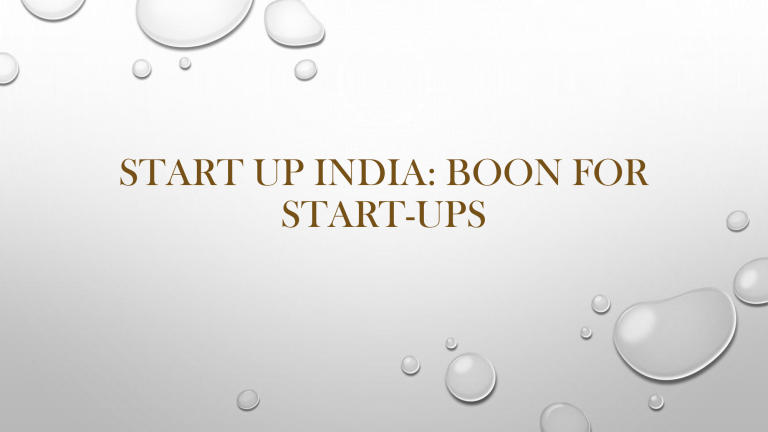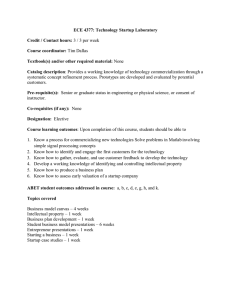
START UP INDIA: BOON FOR START-UPS What is a start-up? Startups are formed primarily with the intention of fast growth and to offer something to a very large market. On the other hand small business ventures are set up to offer products and services to a niche market. How can my venture get recognized as a start-up? Here is the list of specifications to be fulfilled in order for a business to be considered as startup. It can be termed as the salient features of startup and unless each of these requirements is met, it cannot be legally termed as a startup; rather it will be a small business venture. Start-up entity/business These are specific type of businesses that are technology oriented with the aim of high growth potential. Financing will be the most challenging task of have a startup. The reason for this is investors will expect highest potential rate of return on their investment. Age of company Here are some of the factors which can turn a company to be not a startup from being startup. ❖ 100 or more employees ❖ 3000 revenue run rate (forward 12 months) ❖ Worth more than Rs. 30,00 Annual turnover of start-ups Turnover rates from each industry is different, thus annual turnover for all startups cannot be collaborated. However, if the overall annual turnover of any business is over $ Rs. 30,000 million, then it cannot be termed as a startup anymore. Highly innovative product or service Innovation is the key for any startup venture. Instead of spending millions of upgrading the systems and functions, it is necessary to think innovatively to make use of the resources available to generate more revenue. No splitting of existing company allowed If you already have existing companies, splitting it to enjoy the benefits of startup firm is not allowed. A business split to be termed as startup is considered as illegal. Tax exemptions for the start-ups, effective from 2017-18 ➢ Under Section 80-IAC, the Startup incorporated after April 1, 2016 is eligible for getting 100% tax rebate on profit for a period of 3 years. Also, the annual turnover must not exceed Rs. 25 crores in any financial year upto 31 March 2021 ➢ The startups have to pay Minimum Alternate Tax [MAT] at 18.5% along with the applicable surcharge and cess. ➢ Exemptions have been made against capital gains. Long term capital gains (LTCG) will be invested by the Government’s special funds. The investment may go up to INR 50 Lakh and the exemptions will be applied for three years ➢ If the individual holds 50% equity then the company may utilize the invested amount for buying assets before the due date of filing the return ➢ The domestic companies who hold turnover less than INR 5 Crore in the FY 201415 will be liable for 29% tax along with surcharge and other cess. It will be covered under the chapter VI-A ➢ The Finance Minister has also proposed different taxes for the new domestic manufacturing companies that have been setup on or after 1st March, 2016. Such companies will be taxed at 25% plus with cess and surcharge. The tax is proposed on the conditions if the company do not claim any incentives under profit or investment Startup India Scheme There is a mobile application made available by PM Narendra Modi which can be used for registering for a Startup India Scheme. The biggest benefit for webpreneurs and entrepreneurs is there is tax exemption for the first 3 years of the startup being launched Key incentives of Startup India Scheme Here are some of the key reasons why Startup India Scheme is encouraged among young generations. ➢ Compliance based on self-certification ➢ Startup India hub ➢ Rolling-out of mobile app and portal as a regulatory facilitator ➢ Legal support and fast track patent application at lower cost ➢ Relaxed norms for public procurement of start ➢ Faster exit for start-ups ➢ Providing funding support ➢ Credit guarantee fund for start-ups ➢ Tax exemption on capital gains ➢ Tax exemption to start-ups for three years ➢ Tax exemption on investments above fair market value ➢ Industry academia incubation and partnerships Details that should be furnished for Startup Recognition to claim benefit are listed. ➢ Nature of the Entity ➢ Sector ➢ Name of the Entity ➢ Incorporation / Registration No. ➢ Incorporation / Registration Date ➢ PAN ➢ Full Office Address ➢ Authorized Representative Details ➢ Details of Directors ➢ Supporting Documents and Self-Certification ➢ Incorporation/ Registration Certificate ➢ Brief note on innovativeness of products /services offered by the entity ➢ Confirm if you like to avail Tax benefits? ➢ Certification Apart from these make sure you are not getting carried away by the blockbuster ideas that will come up in brain storming, always think through everything from a realistic and practicality perspective. Focus on the execution of what is in plan and then look out for way to expand and enhance the performance.






